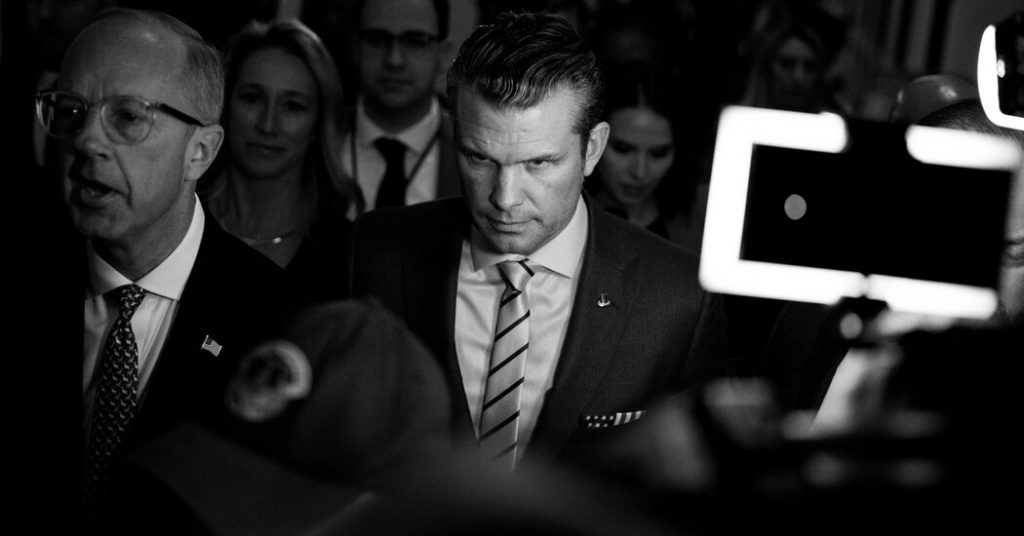Pete Hegseth’s potential appointment as Secretary of Defense under a second Trump administration raises serious concerns about the future direction of the US military. Hegseth, a former Fox News personality and National Guard officer, lacks the experience and qualifications traditionally associated with leading such a complex and vital institution. However, this apparent deficiency is precisely what attracts Trump, who seeks to disrupt the Pentagon rather than manage it effectively. This disruption stems from long-standing right-wing grievances over the perceived failures of the wars in Iraq and Afghanistan, grievances that, while understandable in some respects, are being channeled into dangerous remedies by Trump and his allies.
Trump’s worldview, amplified by figures like Hegseth, centers on a narrative of American decline fueled by internal enemies and a weakened military hampered by liberal social policies. This narrative resonates with a segment of the population, particularly those who felt betrayed by the unfulfilled promises of post-9/11 triumphalism. Trump’s rhetoric rejects international norms and the laws of war, advocates for territorial expansion, and demonizes domestic political opponents, creating a dangerous brew of nationalism and authoritarianism. Hegseth, with his vocal support for pardoning war criminals and his hostility towards diversity and inclusion in the military, embodies this worldview and serves as a willing conduit for Trump’s agenda.
The roots of this discontent can be traced back to the Bush era and the neoconservative fervor that propelled the United States into the Iraq War. The initial promises of swift victory and the spread of democracy quickly gave way to a protracted and costly conflict, leaving many on the right feeling disillusioned and betrayed. This sense of betrayal was amplified by right-wing media, which increasingly focused on blaming internal enemies – liberals, the “deep state,” and those deemed insufficiently patriotic – for America’s perceived failures. Hegseth, himself a veteran of the Iraq and Afghanistan wars, transitioned from defending post-9/11 policies to embracing this narrative of internal sabotage.
Trump capitalized on this resentment, positioning himself as the champion of those who felt forgotten and betrayed by the political establishment. He dismissed the complexities of the Iraq War, arguing that it should never have been fought, and criticized the constraints imposed by the laws of war. This simplistic and often misleading rhetoric resonated with those seeking easy answers and a return to a perceived era of American greatness. Figures like Hegseth further amplified these messages, solidifying Trump’s grip on the right-wing media ecosystem.
Trump’s first term saw clashes with established military leadership, including his own appointees like General Jim Mattis. While initially drawn to the image of a “Mad Dog” general, Trump ultimately turned against those who challenged his authority or expressed reservations about his policies. This experience solidified his desire for a loyalist at the Pentagon, someone who would unquestioningly execute his orders, regardless of their legality or potential consequences. Hegseth, with his unwavering loyalty and shared worldview, fits this mold perfectly.
The potential consequences of a Hegseth-led Pentagon are alarming. His hostility towards international norms and the laws of war, coupled with Trump’s own disregard for these principles, could lead to a more aggressive and unpredictable American foreign policy. Hegseth’s focus on purging the military of perceived “woke” influences could undermine morale and cohesion, weakening the very institution he is tasked with leading. Moreover, his and Trump’s demonstrated willingness to politicize the military raises serious concerns about the future of civil-military relations and the potential for the armed forces to be used for partisan political purposes.
The potential for the politicization of the military under a second Trump administration represents a significant threat to American democracy. The military’s role should be to defend the nation, not to serve the political interests of any individual or party. The normalization of using the military for domestic political purposes, such as suppressing protests or enforcing partisan agendas, would irrevocably damage the integrity of the institution and erode public trust. Furthermore, a military focused on internal culture wars and purging perceived ideological opponents would be ill-equipped to address the complex national security challenges facing the United States.
The Democratic Party must develop a compelling counter-narrative to Trump’s rhetoric on national security and foreign policy. This requires moving beyond simply defending existing institutions and embracing a vision that addresses the legitimate grievances of those who feel left behind by globalization and endless wars. A focus on reducing military spending, prioritizing diplomacy and international cooperation, and promoting a more inclusive and representative military would not only strengthen national security but also resonate with a broader electorate. Failure to offer a compelling alternative risks ceding the ground to Trump and his allies, with potentially disastrous consequences for the future of the military and American democracy.


